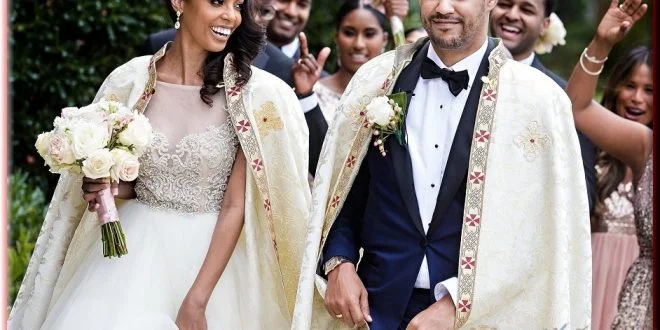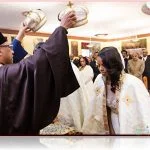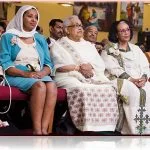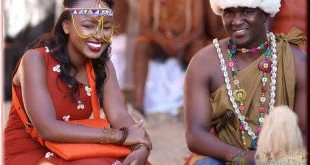The wedding process begins with the groom sending the elders (Shimagle), who then ask for an alliance between the parties. The elders discuss the dowry (ጧሎሽ) and verify that the alleged bride and groom are not relatives, checking their origin in at least seven generations. After the dowry has been agreed and established that there is no relationship between the prospective bride and groom, the wedding is announced and families begin preparations for the church / mosque ceremony and the mels / melsi ceremony. On the wedding day, the bride and groom (ሚዜ) get together early in the morning at the groom’s house and go to the bride’s parents ’house to start the wedding ceremony. In the house of the bride’s parents, the bride prepares and sits awaiting the arrival of the groom. When the groom and his wedding arrive, the bride’s family and friends solemnly block the entrance to the house. The grooms have to either serenade or bribe them to go into the house so that the groom can take the bride with him. In addition, the best man holds perfumes and sprays them throughout the bride’s family home. After this ceremony, the groom picks up his bride, and they, along with the procession, go to the church / mosque to accept their wedding vows.
After the religious ceremony, the wedding procession moves to the park / garden, where guests are served lunch. After the wedding, they usually take pictures, and guests are sent to the reception. At the reception, depending on the ethnic group of the family, several traditional dances are held. Ethiopian weddings usually serve Ethiopian food and live music, and the party usually starts early in the morning. To close the wedding ceremony, the elders sit at the exit of the hall, and the bride and groom together with the wedding bow bow and kiss the elders’ knees when they leave the hall. This is the typical conclusion to the first day of a typical Ethiopian wedding.
During the mels / i ceremony, the ethnic heritage of the family depends, but it is usually smaller than the first ceremony, and the time when close friends and family spend some time with each other and continue to celebrate the newlyweds.
 FolkDanceWorld.Com International Folk Dances
FolkDanceWorld.Com International Folk Dances









